Training
Monthly Online Crisis Response Trainings Continue in 2026
Please feel free to join DMH as it continues a year-long series of virtual trainings designed to empower crisis workers with the skills and knowledge needed to effectively respond to behavioral health crises. Our program began in May 2025 and includes:
Technical Assistance: Ongoing support for CSUs, 988 Call Centers, and Mobile Crisis Response Teams.
Monthly Virtual Trainings: Tailored sessions for Mobile Crisis Response Teams, Crisis Stabilization Unit employees, youth crisis workers, and 988 Center staff.
Expert-Led Topics: Focus on culturally responsive care, effective safety plan development, suicide risk assessments, best practices in mobile crisis response, safety protocols, law enforcement engagement, adolescent and youth crisis response, and more.
Peer Input: Trainings shaped by the insights and experiences of your fellow crisis workers.
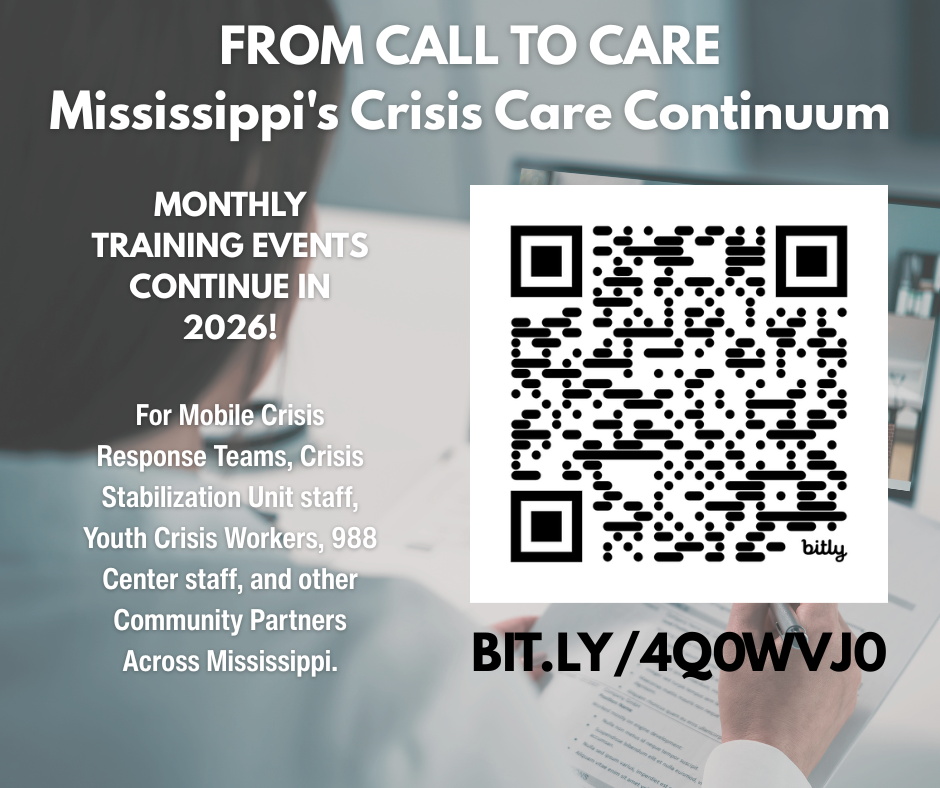
Don’t miss this opportunity to enhance your skills and make a difference in your community. Register now to secure your spot!
January 9: Monthly Online Crisis Response Training – Crisis Response Specific to the Needs of Mississippi’s Communities
February 13: TBD
March 13: TBD
April 10: TBD
May 8: TBD
June 12: TBD
July 10: TBD
Mental Health First Aid (MHFA)
Mental Health First Aid (MHFA) is a skills-based training course that teaches participants to identify, understand, and respond to mental health and substance use challenges. The training provides the skills needed to reach out and provide initial help and support to someone who may be developing a mental health or substance use problem or experiencing a crisis. By completing MHFA training, individuals become better prepared to support those around them who may be facing mental health challenges, thereby contributing to the overall well-being of their communities.
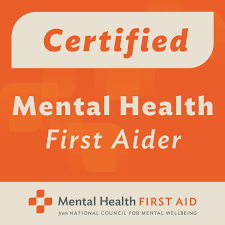
The training has multiple versions including:
• Youth
• Adult
• Public Safety
Shatter the Silence
Shatter the Silence: Suicide—The Secret You Shouldn’t Keep is a suicide prevention awareness campaign of the Mississippi Department of Mental Health that was developed in 2008 through funding from a Garrett Lee Smith Youth Suicide Prevention grant. The campaign includes a no cost 45–60-minute presentation that provides training about mental health, stigma related to mental illness, resources to help someone who has a mental illness, warning signs for suicide, what to and not to do when someone has thoughts of suicide, and where to go for help, or information.
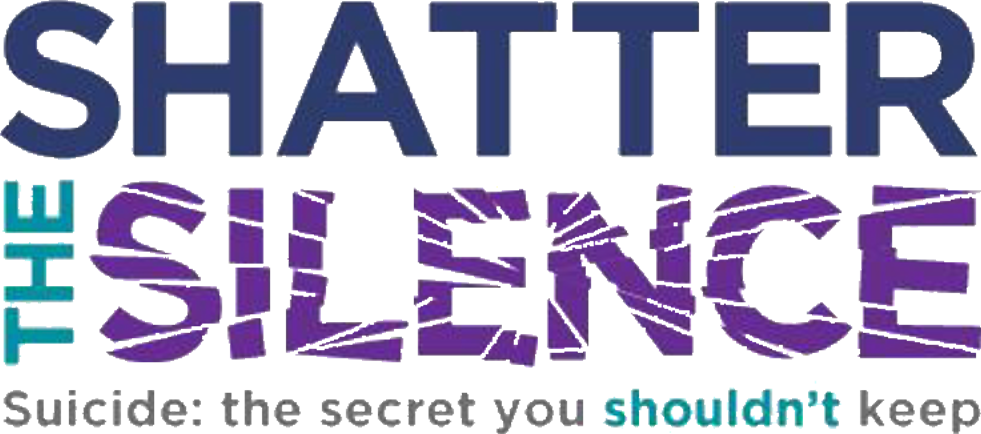
The training has multiple versions including:
• Youth, Adult, &Older Adult
• Youth & Adult (Faith Based)
• Postpartum
• Military
• Law Enforcement & First Responders
Culturally and Linguistically Appropriate Services (CLAS)
The National Standards for Culturally and Linguistically Appropriate Services in Health and Health Care (The National CLAS Standards) aim to improve health care quality and advance health equity by establishing a framework for organizations to serve the nation’s increasingly diverse communities.
Over the past several years, behavioral health providers and education systems are recognizing the value of the National CLAS Standards in advancing behavioral health equity. Mississippi Department of Mental Health (DMH) is deeply committed to building our state’s capacity to serve all communities.
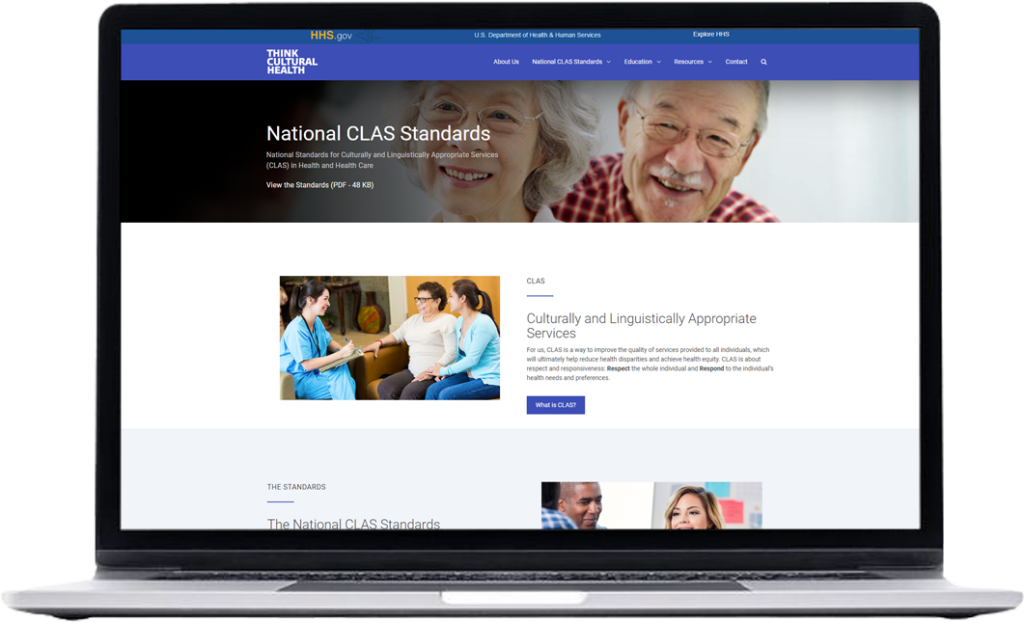
Relias Learning
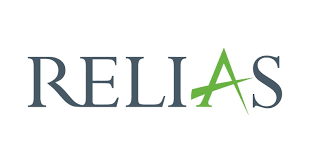
The Department of Mental Health provides Web-Based Training through Relias Learning (formerly Essential Learning) for registered providers. Relias is a customized learning management system and staff development tool. This training website, developed for DMH staff, presents and tracks training requirements in an accessible and easy to use format. To access this program click the following link: https://dmh.training.reliaslearning.com. For more information about Relias, please contact your program’s Staff Development officer. From time to time, DMH may post featured trainings that will be highlighted here. Please monitor this page for any specific trainings that are highlighted in the future.
The Golden Thread of Assessment, Planning, and Progress Notes
This one-hour training provides an overview of the Golden Thread of Assessment, Planning, and Progress Notes. The assessment is the beginning of the process, identifying symptoms and behaviors that will be addressed in the plan, which will structure treatment through specific interventions. Progress notes throughout treatment will document experiences and should lead providers back to a review of the plan. The assessment, plan, and notes should all flow from each other, which is why the Division of Recovery and Resiliency describes this process as the Golden Thread. Watch the video below for the first part of this training.
Additional topics covered in this training:
Entire Golden Thread training series
DMH’s Golden Thread – Adult Community Mental Health Services
DMH’s Golden Thread – Individual Service Plans
DMH’s Golden Thread – Initial Assessment (Children and Youth)
DMH’s Golden Thread – Alcohol and Drug Addiction
Technical Assistance
DMH may also highlight technical assistance training or videos below. Any videos below will be intended to provide technical assistance or further guidance to CMHCs or other Certified Providers regarding DMH Operational Standards and the Mississippi system of care.


